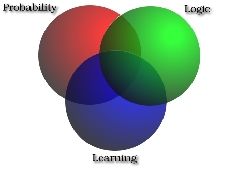|
|
"Probabilistic ILP" - Tutorial
Topic
One of the central open questions in data mining, machine learning and
artificial intelligence, concerns probabilistic logic learning,
sometimes also called statistical relational learning or
probabilistic logic learning:
the integration of relational or logical representations,
probabilistic reasoning mechanisms with machine learning and data
mining principles.
 In the past few years, this question has received a
lot of attention. Various different approaches have been developed
in several related, but different areas (including machine learning, statistics,
inductive logic programming, databases, and reasoning under uncertainty).
Most researchers only have exposure to one or two of the constituents
underlying probabilistic inductive logic programming:
In the past few years, this question has received a
lot of attention. Various different approaches have been developed
in several related, but different areas (including machine learning, statistics,
inductive logic programming, databases, and reasoning under uncertainty).
Most researchers only have exposure to one or two of the constituents
underlying probabilistic inductive logic programming:
The tutorial will survey and overview those developments that
lie at the intersection of logical (or relational) representations,
probabilistic reasoning and learning.
More precisely, we start from inductive logic programming
and show
- how inductive logic programming (ILP) formalisms, settings and
techniques [MD94]
can be extended to deal with probabilistic issues, and
- how these learning settings for probabilistic inductive logic programming
cover state-of-the-art
statistical relational learning approaches [DK03].
This, we hope, should allow the attendant to appreciate the
differences and commonalities between the various approaches - in particular from
a learning perspective - and between {probabilistic ILP and its underlying
constituents, ILP and statistical learning.
Before describing the tutorial in more detail, let us specify what we
mean by Probabilistic Logic Learning. The term
probabilistic in our context refers to the use of probabilistic
representations and reasoning mechanisms grounded in probability
theory, such as Bayesian networks, hidden Markov models, and stochastic
grammars. The term logic programming refers to first-order logical and
relational representations such as those studied
within the field of computational logic. The primary advantage of
using first-order logic or relational representations is that it
allows one to elegantly represent complex situations involving a
variety of objects as well as relations among the objects.
The term inductive refers to deriving
the different aspects of the probabilistic logic on the basis of data.in the context of probabilistic logic.
So,
probabilistic inductive logic programming aims at
combining its three underlying constituents: learning and
probabilistic reasoning within first-order logical and relational representations.
Frameworks developed include David Poole's probabilistic Horn abduction (PHA) [Poo93],
Ngo and Haddawy's probabilistic-logic programs (PLPs) [NH97],
Muggleton's stochastic logic programs (SLPs) [Mug96,Cuss00],
Sato's PRISM [Sat95,SK01],
Koller et al.'s probabilistic relational models (PRMs) [FGKP99,Pfe00,Get01],
Jaeger's relational Bayesian networks (RBNs) [Jae97],
Kersting and De Raedt's Bayesian logic programs (BLPs) [KD01a,KD01b],
Getoor's statistical relational models (SRMs) [Get01],
Anderson et al.'s and Kersting et al.'s relational Markov Models [ADW02,KRKD03],
Shangai et al.'s dynamic PRMS (DPRMs) [DW03], and many more.
The recent interest in probabilistic logic learning may be explained by the steady growing body of
the work addressing the pairwise intersection and by the fact
that it diverges from traditional approaches which assume data instances are structurally identical and
statistically independent or assume that relationships are
deterministic. Therefore, it is not surprising that
several workshops (SRL-00 at AAAI, SRL-03 at IJCAI, SRL-04 at ICML,
19th Machine Intelligence workshop on ``Reasoning and Uncertainty: methods and applications'',
a recent Dagstuhl seminar on ``Probabilistic, Logical and Relational Learning - Towards a Synthesis''),
research projects (EELD, APrIL I, APrIL II, ...), and (invited/honorary) talks
(such as Daphne Koller at IJCAI-01, ICML-03/KDD-03 and Foster Provost at
ICML-03) addressed this new challenge of machine learning.
| |



